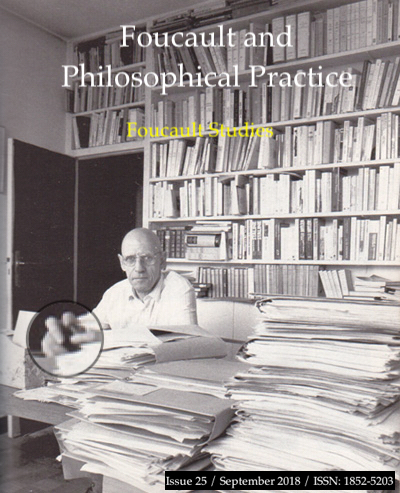FREEDOM IN THE ARCHIVE: On Doing Philosophy through Historiography
DOI:
https://doi.org/10.22439/fs.v0i25.5576Keywords:
history, archive, sensibility, knowledge, conditions, subjectivity, objectivity, possibility, cognition, Idea, truthAbstract
It is argued in this article that Foucault’s most distinctive contribution to philosophical practice is to be found in his distinctive mode of taking up historiography, exploring critically the conditions and limits of knowledge through archival work. The focus on knowledge would seem to place him in the critical lineage of Kant; however, his appeal to history and archival explorations reconfigure the relation between sensibility and the understanding in a way that suggests a different concern with the conditions of “a possible knowledge.” After discussing how Foucault’s archival work engages a distinct sensibility, I suggest that his concern with knowledge can best be understood not within a transcendental project, however historicized, but within the logical space of Hegel’s Doctrine of the Concept, specifically the discussion of the Idea of cognition where it is a question of the twin processes of unifying subjectivity and objectivity as expressive of cognition’s “urge to truth.” Understood within this conceptual context, Foucault’s distinctive archival approach to what he calls “subjectivation” and “objectivation” allows us to appreciate the distinction between knowledge and truth in a way that leaves open the possibility of transformation.References
Badiou, Alain, The Adventure of French Philosophy. London : Verso, 2012.
Baugh, Bruce, French Hegel: From Surrealism to Postmodernism, London: Routledge, 2003.
Boquet, Damien, Blaise Dufal, and Pauline Labey, eds. Une histoire au présent: Les historiens et Michel Foucault. Paris: CNRS, 2013.
Collingwood, R.G., An Essay on Philosophical Method. Oxford: Clarendon Press, 1936.
Connolly, William E, ‘’Beyond Good and Evil: The Ethical Sensibility of Michel Foucault,’’ Political Theory 21 :3 (1993), 367.
Derrida, Jacques, Archive Fever: A Freudian Impression. Chicago: University of Chicago Press, 1996.
Eliassen, Knut Ove, « The Archives of Michel Foucault » in The Archive in Motion : New Conceptions of the Archive in Contemporary Thought, ed. Eivind Rossaak. Oslo: Novus Press, 2010.
Eribon, Didier, Michel Foucault. Cambridge: Harvard University Press, 1991.
Falzon, Christopher and Timothy O’Leary, “Introduction: Foucault’s Philosophy,” Foucault and Philosophy, eds. Timothy O’Leary and Christopher Falzon, 1-16. Oxford: Wiley-Blackwell, 2010.
Farge, Arlette, ‘’Travailler avec Michel Foucault’’ Le débat, 41:4 (1986), 164-167.
Farge, Arlette, ‘’Écrire l’histoire’’, Hypothèse 7:1 (2004), 317-318.
Farge, Arlette, The Allure of the Archives. New Haven: Yale University Press, 2013.
Farge, Arlette and Michel Foucault, Disorderly Families: Infamous Letters from the Bastille Archives, ed Nancy Luxon. Minneapolis: University of Minnesota Press, 2016.
Fillion, Réal, ‘’Foucault after Hyppolite: Toward an A-theistic Theodicy’’ The Southern Journal of Philosophy 43:1 (2005), 79-93.
Foucault, Michel, Hisitoire de la folie. Paris: Gallimard, 1972.
Foucault, Michel, The Archaeology of Knowledge and the Discourse on Language. New York: Pantheon Books, 1972.
Foucault, Michel, Herculine Barbin dite Alexina B. Paris: Gallimard, 1978.
Foucault, Michel, Herculine Barbin: Being the Recently Discovered Memoirs of a Nineteenth Century French Hermaphrodite, New York: Vintage Books, 1980.
Foucault, Michel, ‘’What is Enlightenment?’’ in The Foucault Reader, ed. Paul Rabinow, 32-50. New York: Pantheon, 1984
Foucault, Michel, Mental Illness and Psychology. Berkley: University of California Press, 1987.
Foucault, Michel, “Des espaces autres” Dits et écrits IV. Paris: Gallimard, 1994.
Foucault, Michel, “Foucault,” in Aesthetics, Method, and Epistemology: Essential Works of Foucault 1954-1984, Volume 2, ed. James D. Faubion, 459 -463. New York: New Press, 1998.
Foucault, Michel, Power: Essential Works of Foucault’’ [1954-1984], Volume 3. New York: The New Press, 2000.
Foucault, Michel, Abnormal: Lectures at the Collège de France [1974-1975]. New York: Picador, 2003.
Foucault, Michel, The Hermeneutics of the Subject: Lecture at the Collège de France [1982-1982]. London: Palgrave Macmillan, 2005.
Foucault, Michel, Security, Territory, Population: Lecture at the Collège de France [1977-1978]. New York: Picador, 2009.
Foucault, Michel, The Punitive Society: Lectures at the Collège de France [1972-1973]. London: Palgrave Macmillan, 2015.
Foucault, Michel, Subjectivity and Truth: Lectures at the Collège de France [1980-1981]. London: Palgrave Macmillan, 2017.
Foucault, Michel, Les aveux de la chair. Paris: Gallimard, 2018.
Geroulanos, Stefanos, Transparency in Postwar France: A Critical History of the Present. Stanford: Stanford University Press, 2017.
Han, Béatrice, Foucault’s Critical Project: Between the Transcendental and the Historical, Stanford: Stanford University Press, 2002.
Han-Pile, Béatrice, « Is early Foucault a Historian? History, history and the analytic of finitude » Philosophy & Social Criticism, 31: 5-6 (2005), 585-608.
Hegel, G.W.F., Phenomenology of Spirit. Oxford: Oxford University Press, 1977.
Hegel, G.W.F., Science of Logic. New York: Humanities Press, 1969.
Kelm, Holden, ‘’With Hegel Against Hegel?: Strategic and Methodological Implications of Foucault’s Anti-Hegelianism’’ Hegel-Jahrbuch (2015), 323-328.
Lawlor, Leonard, Thinking Through French Philosophy: The Being of the Question. Bloomington: Indiana University Press, 2003.
Le Goff, Jacques, and Pierre Nora, Faire de l’histoire. Paris: Gallimard, 1974.
Macey, David, The Lives of Michel Foucault. New York: Vintage Books, 1993.
McCumber, John, Time and Philosophy: A History of Continental Thought, Durham: Acumen, 2011.
Megill, Allen, “The Reception of Foucault by Historians” Journal of the History of Ideas 48:1 (1987), 117-141.
Muldoon, James, ‘’Foucault’s Forgotten Hegelianism’’ Parrhesia 21 (2014), 102-112.
Nora, Pierre, (ed.) Essais d'ego-histoire. Paris: Gallimard, 1987.
Perrot, Michelle (ed.), L’impossible prison: Recherches sur le système pénitentiaire au XIXe siècle. Paris: Seuil, 1980.
Veyne, Paul « Foucault Revolutionizes History, » in Foucault and his Interlocutors, ed. Arnold Davidson, 146-182. Chicago: University of Chicago Press, 1997.
Winfield, Richard Dien, Overcoming Foundations: Studies in Systematic Philosophy. New York: Columbia University Press, 1989.
Winfield, Richard Dien, Hegel’s Science of Logic: A Critical Rethinking in Thirty Lectures. Lanham: Rowman & Littlefield Publishers, 2012.
Downloads
Published
How to Cite
Issue
Section
License
Authors retain copyright to their work, but assign the right of the first publication to Foucault Studies. The work is subject to a CC BY-NC-ND 4.0 license, but despite these restrictions, authors can take for granted that Foucault Studies will permit articles published in Foucault Studies to be translated or reprinted in another format such as a book providing a full reference is made to Foucault Studies as the original place of publication.



